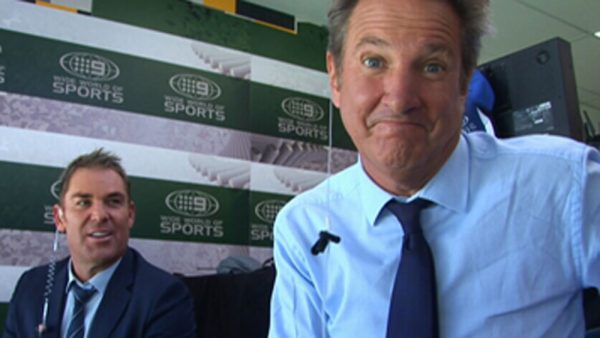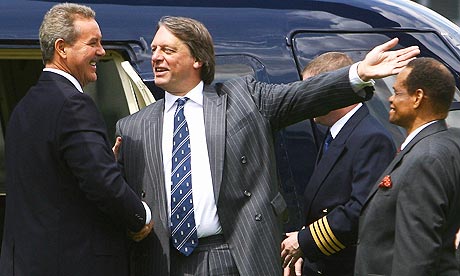
A gradual but inevitable descent into cricket-based loathing and bile.
The 51allout Bargain Basement Book Bonanza: Mark Nicholas’s A Beautiful Game
The 51allout writers – probably like cricket fans in general – can be divided into two camps: those who detest Mark Nicholas, and me. Many many people regard him as a pompous, overly-coiffured wannabe Australian who is in love with himself as much as he is in love with the word crackerjack. But for me, well he is a pompous, overly-coiffured wannabe Australian who is in love with himself as much as he is in love with the word crackerjack, but he was the voice of the 2005 Ashes and, more importantly, was captain of Hampshire at a time that I started to follow the county. Which overrides the rush of nausea each time he gently tickles Warnie’s bumhole with his moistened tongue.

Their faces tell the full story.
So what of Jefford’s book? Part autobiography, part love letter, it is bearable. But it is bearable in the same way that getting pissed on expensive premium lager is bearable – ignore the bloated stomach, the diminishing bank balance and the desire to sit down and enjoy a nice pint of best bitter and it’s fun for the first hour or so. But then Nicholas really get going, with the purplest of prose, the clanging of a namedrop and about as much self-awareness as a Richard Keys blog.
Here are some examples of its many, many flaws.
It is pompous. “I was upset when Paul stood down. A few niggling issues had come his way, not least my interference in matches that he captained when I was ill or injured. He was also disapproving of my approach to certain complicated issues that arose over a long period of governance. He regrets his decision now, much as I regret interfering with his brief spells at the helm.”
It’s arrogant. “At a restaurant in Leeds in 1987, the Hampshire president Wilfred Weld, the vice-chairman Bill Hughes and I made plans that would change Hampshire cricket forever. The old ground at Northlands Road was small and dilapidated…let’s build a new one, I said…I made a short three-dimensional graphic film that we used for promotional events and even wrote a marketing paper that included a new constitution for the club based around the model of a Southampton city franchise. Such ideas are all the rage now.”
It’s staggeringly tactless. “Wind the clock forward to January 2011 and the living room of a barely furnished apartment in Perth. It was there that the same Robin Smith was found on the floor, curled up and contemplating suicide. This gentle and beautiful man has been dragged into an abyss of alcohol and antidepressants.” There is more about Robin Smith, but we can’t bring ourselves to quote it, so humiliating is it to read.
It seems that a guitarist has been plagiarising 51allout. “Thanks to the internet, it has never been easier to be a cricket writer. Anyone can write and many do. The range is stupefying, stretching across many a divide – from academics to comedians and musicians, for instance. Recently, I was sent a piece by Felix White, the guitarist in the Indie band, the Maccabees. He steps out with Florence, she of the Machine. It was good stuff, misty-eyed about his Nasser Hussain, Graham Thorpe and Mark Ramprakash of long ago.”

“So halfway through an article about Peter Such, I threw in a picture of Harold Bishop and lo and behold, we received one retweet!”
It brushes off criticism. “I came in for some stick – hyperbole and exclamations being the main grumble – but no one appeared to doubt the passion, enthusiasm or energy that I, and we, gave the seven years during which Channel 4 held the rights.”
It doesn’t call Giles Clarke a cock. “I was sharing a drink and a laugh with David Brook, who had by now left Channel 4, when the non-executive chairman of the ECB’s marketing committee, Giles Clarke, pushed his way into our conversation to say that he didn’t know what we found so amusing because within a year or so we were unlikely to be televising cricket. It was an odd moment. Or, as Brook called it later, a chilling moment.”

An utter cock who tried to ruin the game. And Sir Allen Stanford.
It is creepy. “Warne acknowledged the crowd by holding the ball aloft and kissing his wristband, a gift from a pretty girl – his daughter Brooke.”
Its prose can be ill-judged. “This South African man in his English coat and with hair of many colours made 158, the exact score another South African man, with a face of colour, had made when batting for England on the same ground against the same opponent 37 years earlier. Basil D’Oliveira’s 158 was to change the world; Pietersen’s merely changed the order of things.”
Annoyingly, there ought to be a good book here, for Nicholas clearly loves the game and has a fair understanding of its history and appreciates what makes cricket so fascinating. He was a long-standing Hampshire captain, and his tenure at Channel 4 was a breath of fresh air after the stagnant smog of the BBC coverage. Sadly, the stench of self-love overwhelms the reader; if you do decide to read this book, we strongly suggest you have a supply of buckets with you, as they will be filled up quickly with vomit.

Just a normal day in the 51allout office.

1 Comment
Post a Comment
1
Nichael Bluth
24 Oct 2017 10:56
I’m impressed you made it all the way through this article without using the word cunt.